Expanding Water Access: Freetown's Unserved Communities Project
VerifiedAdded on 2023/06/18
|7
|1638
|173
Report
AI Summary
This report examines the critical need for improved water facilities in underserved communities within Freetown and its rural areas, highlighting the challenges posed by water scarcity due to population growth, unstable consumption, and climate change. It explores solutions such as desalination and water recycling, emphasizing the importance of sustainable water management practices. The report discusses the reliance on groundwater sources in rural areas and the impact of various factors on water supply, including consumption patterns across domestic, industrial, and agricultural sectors. It further outlines measures that governments should consider, such as revising water laws, promoting economic incentives for water conservation, encouraging private sector involvement, and implementing effective public awareness campaigns. The document concludes by stressing the necessity of careful water resource management and the implementation of strategies to ensure optimal utilization and reduce water requirements, pointing to the role of platforms like Desklib for accessing study resources and similar reports.
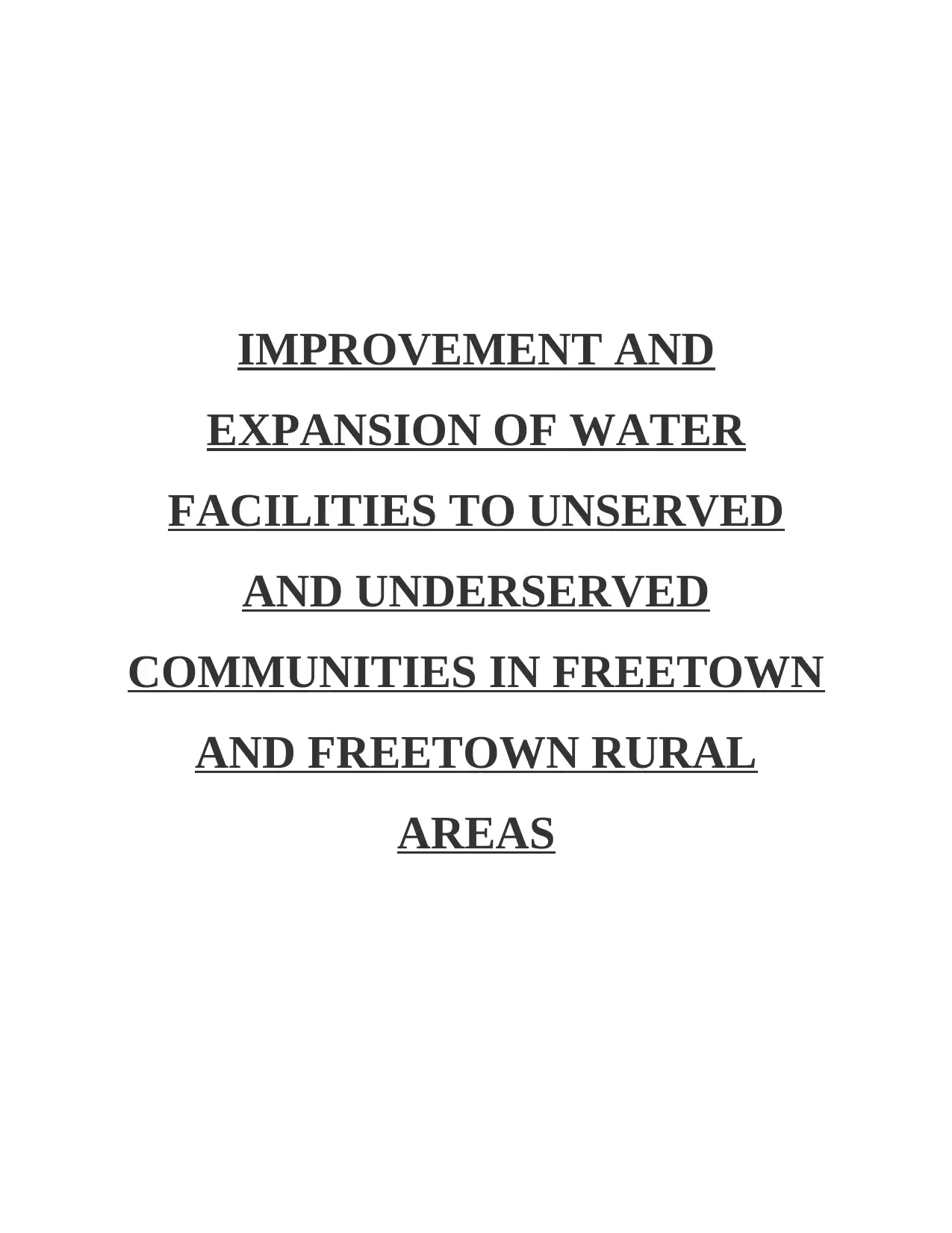
IMPROVEMENT AND
EXPANSION OF WATER
FACILITIES TO UNSERVED
AND UNDERSERVED
COMMUNITIES IN FREETOWN
AND FREETOWN RURAL
AREAS
EXPANSION OF WATER
FACILITIES TO UNSERVED
AND UNDERSERVED
COMMUNITIES IN FREETOWN
AND FREETOWN RURAL
AREAS
Paraphrase This Document
Need a fresh take? Get an instant paraphrase of this document with our AI Paraphraser
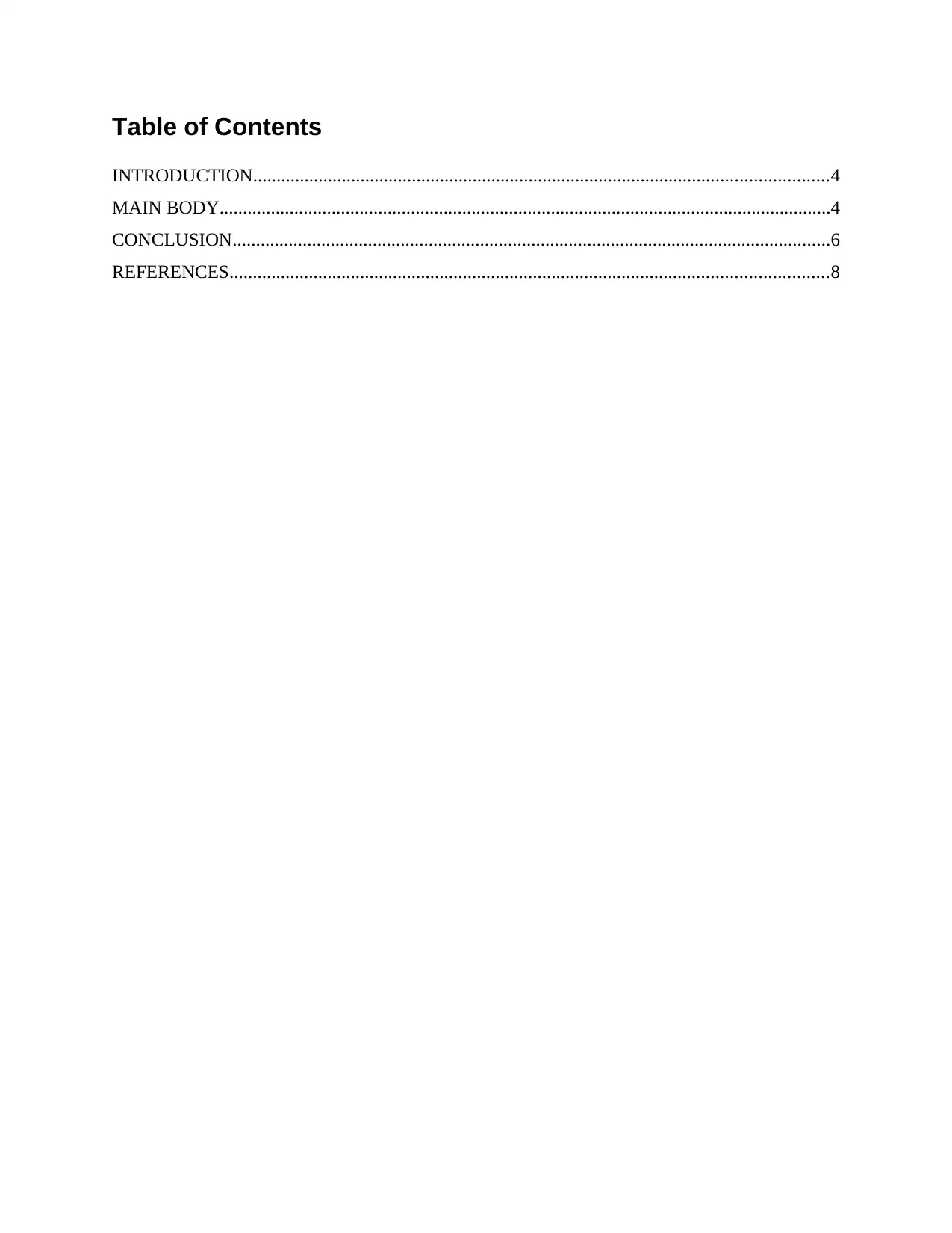
Table of Contents
INTRODUCTION...........................................................................................................................4
MAIN BODY...................................................................................................................................4
CONCLUSION................................................................................................................................6
REFERENCES................................................................................................................................8
INTRODUCTION...........................................................................................................................4
MAIN BODY...................................................................................................................................4
CONCLUSION................................................................................................................................6
REFERENCES................................................................................................................................8
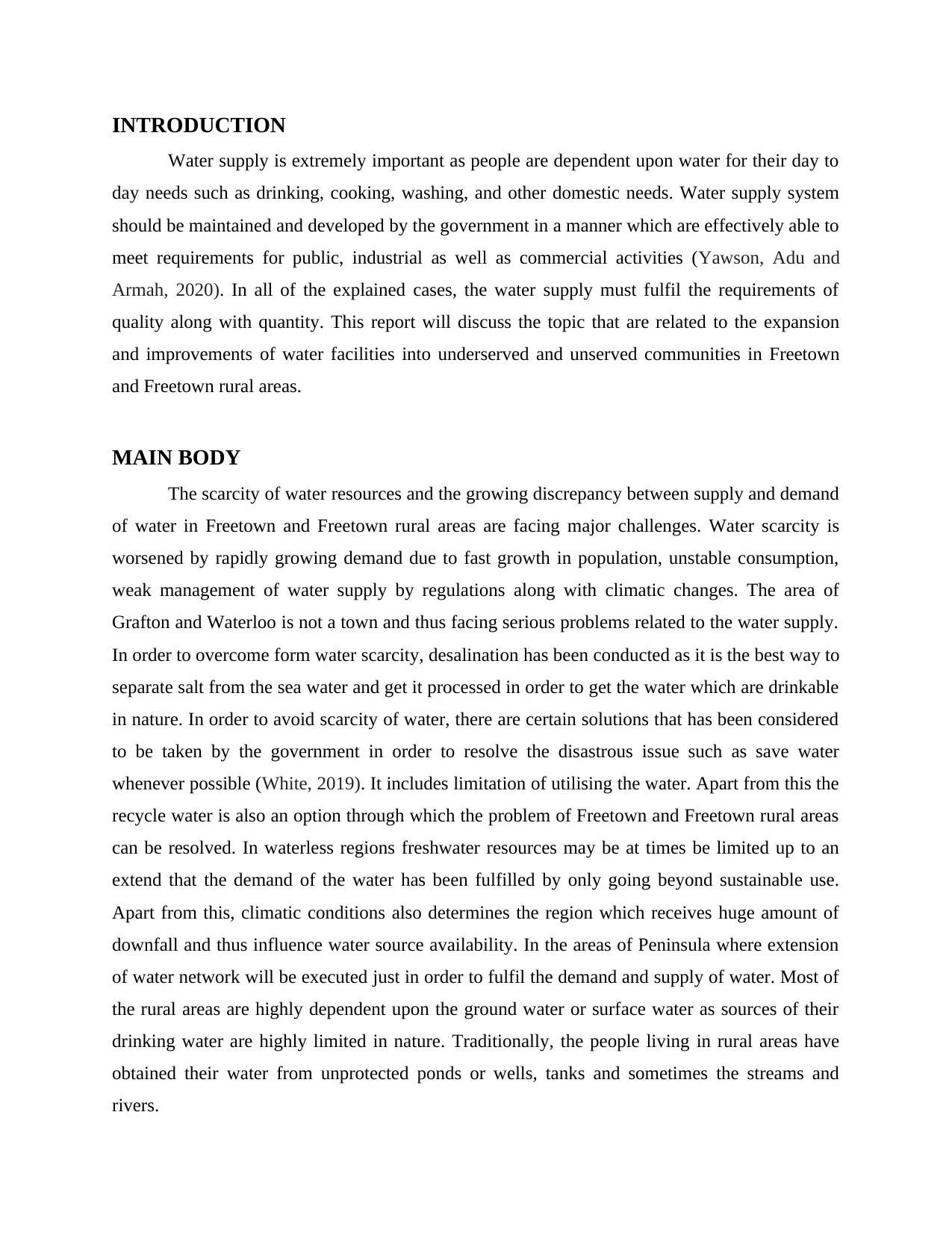
INTRODUCTION
Water supply is extremely important as people are dependent upon water for their day to
day needs such as drinking, cooking, washing, and other domestic needs. Water supply system
should be maintained and developed by the government in a manner which are effectively able to
meet requirements for public, industrial as well as commercial activities (Yawson, Adu and
Armah, 2020). In all of the explained cases, the water supply must fulfil the requirements of
quality along with quantity. This report will discuss the topic that are related to the expansion
and improvements of water facilities into underserved and unserved communities in Freetown
and Freetown rural areas.
MAIN BODY
The scarcity of water resources and the growing discrepancy between supply and demand
of water in Freetown and Freetown rural areas are facing major challenges. Water scarcity is
worsened by rapidly growing demand due to fast growth in population, unstable consumption,
weak management of water supply by regulations along with climatic changes. The area of
Grafton and Waterloo is not a town and thus facing serious problems related to the water supply.
In order to overcome form water scarcity, desalination has been conducted as it is the best way to
separate salt from the sea water and get it processed in order to get the water which are drinkable
in nature. In order to avoid scarcity of water, there are certain solutions that has been considered
to be taken by the government in order to resolve the disastrous issue such as save water
whenever possible (White, 2019). It includes limitation of utilising the water. Apart from this the
recycle water is also an option through which the problem of Freetown and Freetown rural areas
can be resolved. In waterless regions freshwater resources may be at times be limited up to an
extend that the demand of the water has been fulfilled by only going beyond sustainable use.
Apart from this, climatic conditions also determines the region which receives huge amount of
downfall and thus influence water source availability. In the areas of Peninsula where extension
of water network will be executed just in order to fulfil the demand and supply of water. Most of
the rural areas are highly dependent upon the ground water or surface water as sources of their
drinking water are highly limited in nature. Traditionally, the people living in rural areas have
obtained their water from unprotected ponds or wells, tanks and sometimes the streams and
rivers.
Water supply is extremely important as people are dependent upon water for their day to
day needs such as drinking, cooking, washing, and other domestic needs. Water supply system
should be maintained and developed by the government in a manner which are effectively able to
meet requirements for public, industrial as well as commercial activities (Yawson, Adu and
Armah, 2020). In all of the explained cases, the water supply must fulfil the requirements of
quality along with quantity. This report will discuss the topic that are related to the expansion
and improvements of water facilities into underserved and unserved communities in Freetown
and Freetown rural areas.
MAIN BODY
The scarcity of water resources and the growing discrepancy between supply and demand
of water in Freetown and Freetown rural areas are facing major challenges. Water scarcity is
worsened by rapidly growing demand due to fast growth in population, unstable consumption,
weak management of water supply by regulations along with climatic changes. The area of
Grafton and Waterloo is not a town and thus facing serious problems related to the water supply.
In order to overcome form water scarcity, desalination has been conducted as it is the best way to
separate salt from the sea water and get it processed in order to get the water which are drinkable
in nature. In order to avoid scarcity of water, there are certain solutions that has been considered
to be taken by the government in order to resolve the disastrous issue such as save water
whenever possible (White, 2019). It includes limitation of utilising the water. Apart from this the
recycle water is also an option through which the problem of Freetown and Freetown rural areas
can be resolved. In waterless regions freshwater resources may be at times be limited up to an
extend that the demand of the water has been fulfilled by only going beyond sustainable use.
Apart from this, climatic conditions also determines the region which receives huge amount of
downfall and thus influence water source availability. In the areas of Peninsula where extension
of water network will be executed just in order to fulfil the demand and supply of water. Most of
the rural areas are highly dependent upon the ground water or surface water as sources of their
drinking water are highly limited in nature. Traditionally, the people living in rural areas have
obtained their water from unprotected ponds or wells, tanks and sometimes the streams and
rivers.
⊘ This is a preview!⊘
Do you want full access?
Subscribe today to unlock all pages.

Trusted by 1+ million students worldwide
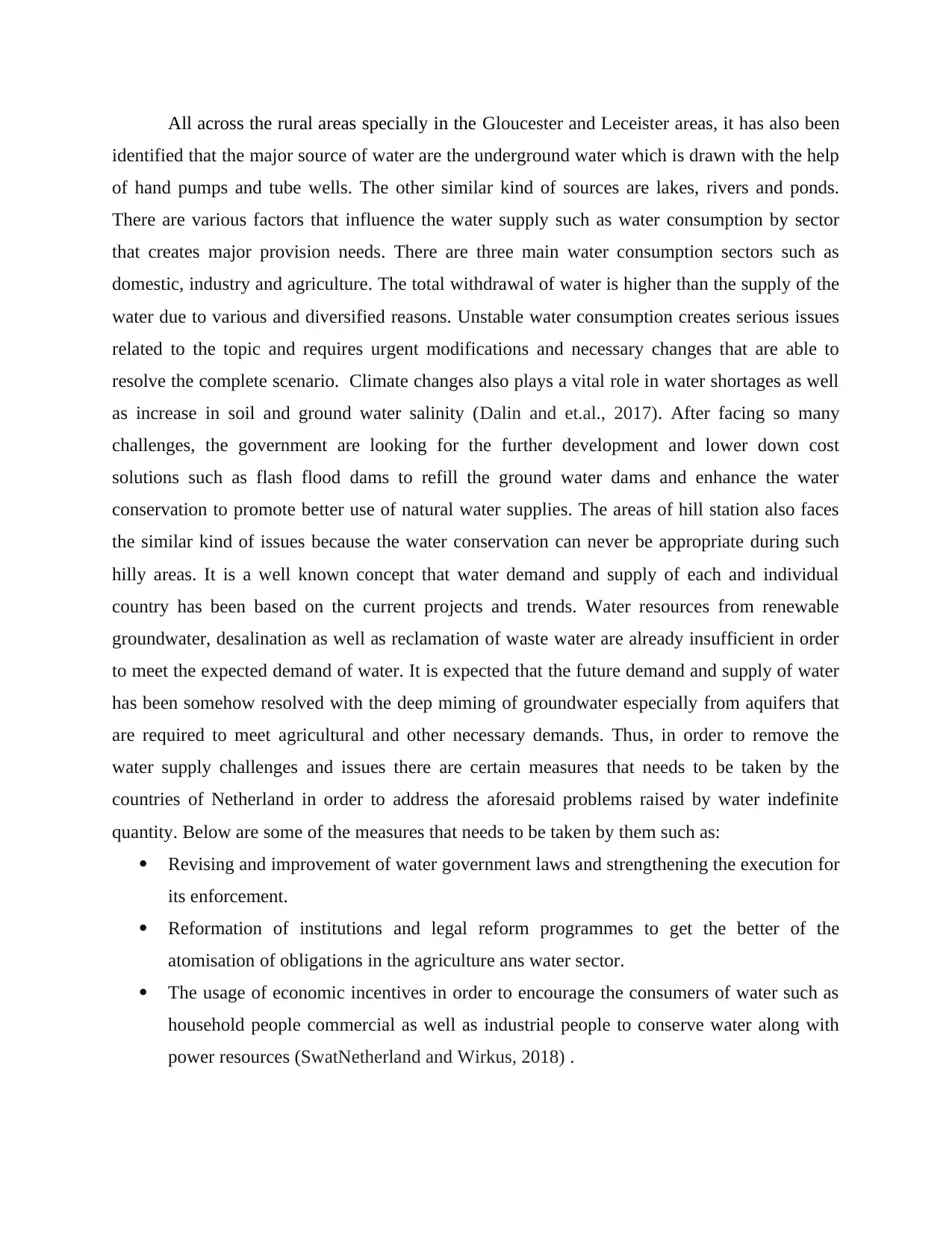
All across the rural areas specially in the Gloucester and Leceister areas, it has also been
identified that the major source of water are the underground water which is drawn with the help
of hand pumps and tube wells. The other similar kind of sources are lakes, rivers and ponds.
There are various factors that influence the water supply such as water consumption by sector
that creates major provision needs. There are three main water consumption sectors such as
domestic, industry and agriculture. The total withdrawal of water is higher than the supply of the
water due to various and diversified reasons. Unstable water consumption creates serious issues
related to the topic and requires urgent modifications and necessary changes that are able to
resolve the complete scenario. Climate changes also plays a vital role in water shortages as well
as increase in soil and ground water salinity (Dalin and et.al., 2017). After facing so many
challenges, the government are looking for the further development and lower down cost
solutions such as flash flood dams to refill the ground water dams and enhance the water
conservation to promote better use of natural water supplies. The areas of hill station also faces
the similar kind of issues because the water conservation can never be appropriate during such
hilly areas. It is a well known concept that water demand and supply of each and individual
country has been based on the current projects and trends. Water resources from renewable
groundwater, desalination as well as reclamation of waste water are already insufficient in order
to meet the expected demand of water. It is expected that the future demand and supply of water
has been somehow resolved with the deep miming of groundwater especially from aquifers that
are required to meet agricultural and other necessary demands. Thus, in order to remove the
water supply challenges and issues there are certain measures that needs to be taken by the
countries of Netherland in order to address the aforesaid problems raised by water indefinite
quantity. Below are some of the measures that needs to be taken by them such as:
Revising and improvement of water government laws and strengthening the execution for
its enforcement.
Reformation of institutions and legal reform programmes to get the better of the
atomisation of obligations in the agriculture ans water sector.
The usage of economic incentives in order to encourage the consumers of water such as
household people commercial as well as industrial people to conserve water along with
power resources (SwatNetherland and Wirkus, 2018) .
identified that the major source of water are the underground water which is drawn with the help
of hand pumps and tube wells. The other similar kind of sources are lakes, rivers and ponds.
There are various factors that influence the water supply such as water consumption by sector
that creates major provision needs. There are three main water consumption sectors such as
domestic, industry and agriculture. The total withdrawal of water is higher than the supply of the
water due to various and diversified reasons. Unstable water consumption creates serious issues
related to the topic and requires urgent modifications and necessary changes that are able to
resolve the complete scenario. Climate changes also plays a vital role in water shortages as well
as increase in soil and ground water salinity (Dalin and et.al., 2017). After facing so many
challenges, the government are looking for the further development and lower down cost
solutions such as flash flood dams to refill the ground water dams and enhance the water
conservation to promote better use of natural water supplies. The areas of hill station also faces
the similar kind of issues because the water conservation can never be appropriate during such
hilly areas. It is a well known concept that water demand and supply of each and individual
country has been based on the current projects and trends. Water resources from renewable
groundwater, desalination as well as reclamation of waste water are already insufficient in order
to meet the expected demand of water. It is expected that the future demand and supply of water
has been somehow resolved with the deep miming of groundwater especially from aquifers that
are required to meet agricultural and other necessary demands. Thus, in order to remove the
water supply challenges and issues there are certain measures that needs to be taken by the
countries of Netherland in order to address the aforesaid problems raised by water indefinite
quantity. Below are some of the measures that needs to be taken by them such as:
Revising and improvement of water government laws and strengthening the execution for
its enforcement.
Reformation of institutions and legal reform programmes to get the better of the
atomisation of obligations in the agriculture ans water sector.
The usage of economic incentives in order to encourage the consumers of water such as
household people commercial as well as industrial people to conserve water along with
power resources (SwatNetherland and Wirkus, 2018) .
Paraphrase This Document
Need a fresh take? Get an instant paraphrase of this document with our AI Paraphraser
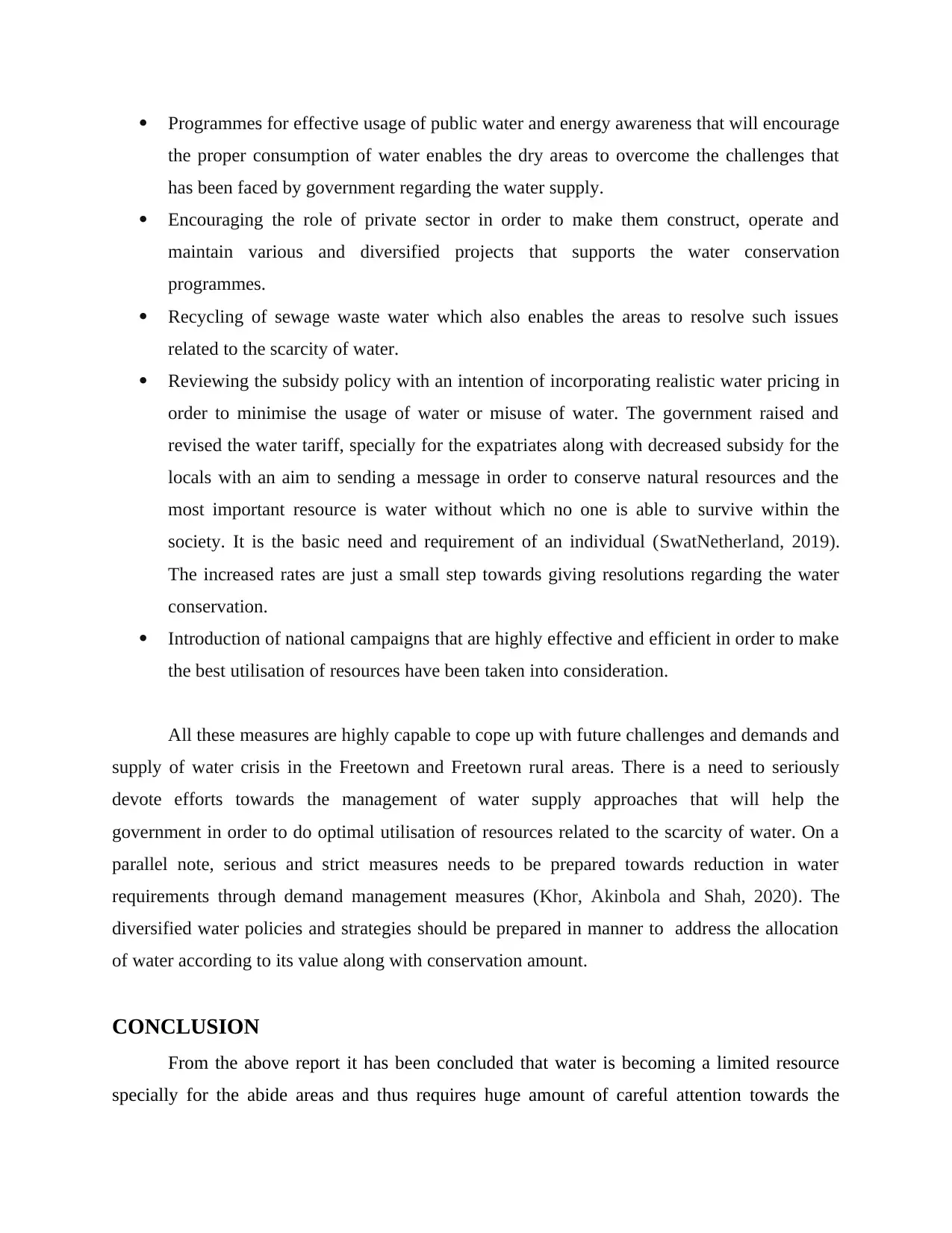
Programmes for effective usage of public water and energy awareness that will encourage
the proper consumption of water enables the dry areas to overcome the challenges that
has been faced by government regarding the water supply.
Encouraging the role of private sector in order to make them construct, operate and
maintain various and diversified projects that supports the water conservation
programmes.
Recycling of sewage waste water which also enables the areas to resolve such issues
related to the scarcity of water.
Reviewing the subsidy policy with an intention of incorporating realistic water pricing in
order to minimise the usage of water or misuse of water. The government raised and
revised the water tariff, specially for the expatriates along with decreased subsidy for the
locals with an aim to sending a message in order to conserve natural resources and the
most important resource is water without which no one is able to survive within the
society. It is the basic need and requirement of an individual (SwatNetherland, 2019).
The increased rates are just a small step towards giving resolutions regarding the water
conservation.
Introduction of national campaigns that are highly effective and efficient in order to make
the best utilisation of resources have been taken into consideration.
All these measures are highly capable to cope up with future challenges and demands and
supply of water crisis in the Freetown and Freetown rural areas. There is a need to seriously
devote efforts towards the management of water supply approaches that will help the
government in order to do optimal utilisation of resources related to the scarcity of water. On a
parallel note, serious and strict measures needs to be prepared towards reduction in water
requirements through demand management measures (Khor, Akinbola and Shah, 2020). The
diversified water policies and strategies should be prepared in manner to address the allocation
of water according to its value along with conservation amount.
CONCLUSION
From the above report it has been concluded that water is becoming a limited resource
specially for the abide areas and thus requires huge amount of careful attention towards the
the proper consumption of water enables the dry areas to overcome the challenges that
has been faced by government regarding the water supply.
Encouraging the role of private sector in order to make them construct, operate and
maintain various and diversified projects that supports the water conservation
programmes.
Recycling of sewage waste water which also enables the areas to resolve such issues
related to the scarcity of water.
Reviewing the subsidy policy with an intention of incorporating realistic water pricing in
order to minimise the usage of water or misuse of water. The government raised and
revised the water tariff, specially for the expatriates along with decreased subsidy for the
locals with an aim to sending a message in order to conserve natural resources and the
most important resource is water without which no one is able to survive within the
society. It is the basic need and requirement of an individual (SwatNetherland, 2019).
The increased rates are just a small step towards giving resolutions regarding the water
conservation.
Introduction of national campaigns that are highly effective and efficient in order to make
the best utilisation of resources have been taken into consideration.
All these measures are highly capable to cope up with future challenges and demands and
supply of water crisis in the Freetown and Freetown rural areas. There is a need to seriously
devote efforts towards the management of water supply approaches that will help the
government in order to do optimal utilisation of resources related to the scarcity of water. On a
parallel note, serious and strict measures needs to be prepared towards reduction in water
requirements through demand management measures (Khor, Akinbola and Shah, 2020). The
diversified water policies and strategies should be prepared in manner to address the allocation
of water according to its value along with conservation amount.
CONCLUSION
From the above report it has been concluded that water is becoming a limited resource
specially for the abide areas and thus requires huge amount of careful attention towards the
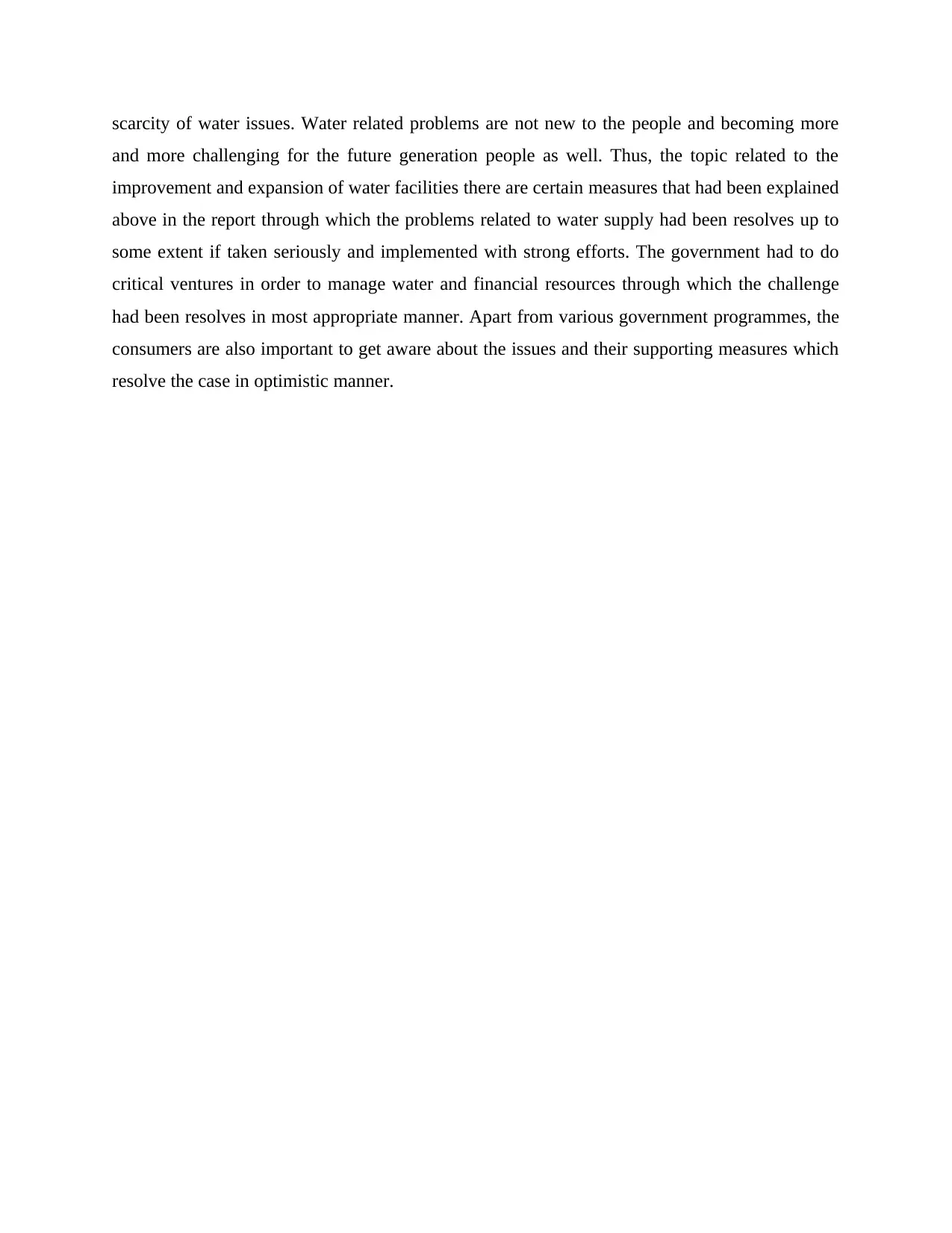
scarcity of water issues. Water related problems are not new to the people and becoming more
and more challenging for the future generation people as well. Thus, the topic related to the
improvement and expansion of water facilities there are certain measures that had been explained
above in the report through which the problems related to water supply had been resolves up to
some extent if taken seriously and implemented with strong efforts. The government had to do
critical ventures in order to manage water and financial resources through which the challenge
had been resolves in most appropriate manner. Apart from various government programmes, the
consumers are also important to get aware about the issues and their supporting measures which
resolve the case in optimistic manner.
and more challenging for the future generation people as well. Thus, the topic related to the
improvement and expansion of water facilities there are certain measures that had been explained
above in the report through which the problems related to water supply had been resolves up to
some extent if taken seriously and implemented with strong efforts. The government had to do
critical ventures in order to manage water and financial resources through which the challenge
had been resolves in most appropriate manner. Apart from various government programmes, the
consumers are also important to get aware about the issues and their supporting measures which
resolve the case in optimistic manner.
⊘ This is a preview!⊘
Do you want full access?
Subscribe today to unlock all pages.

Trusted by 1+ million students worldwide
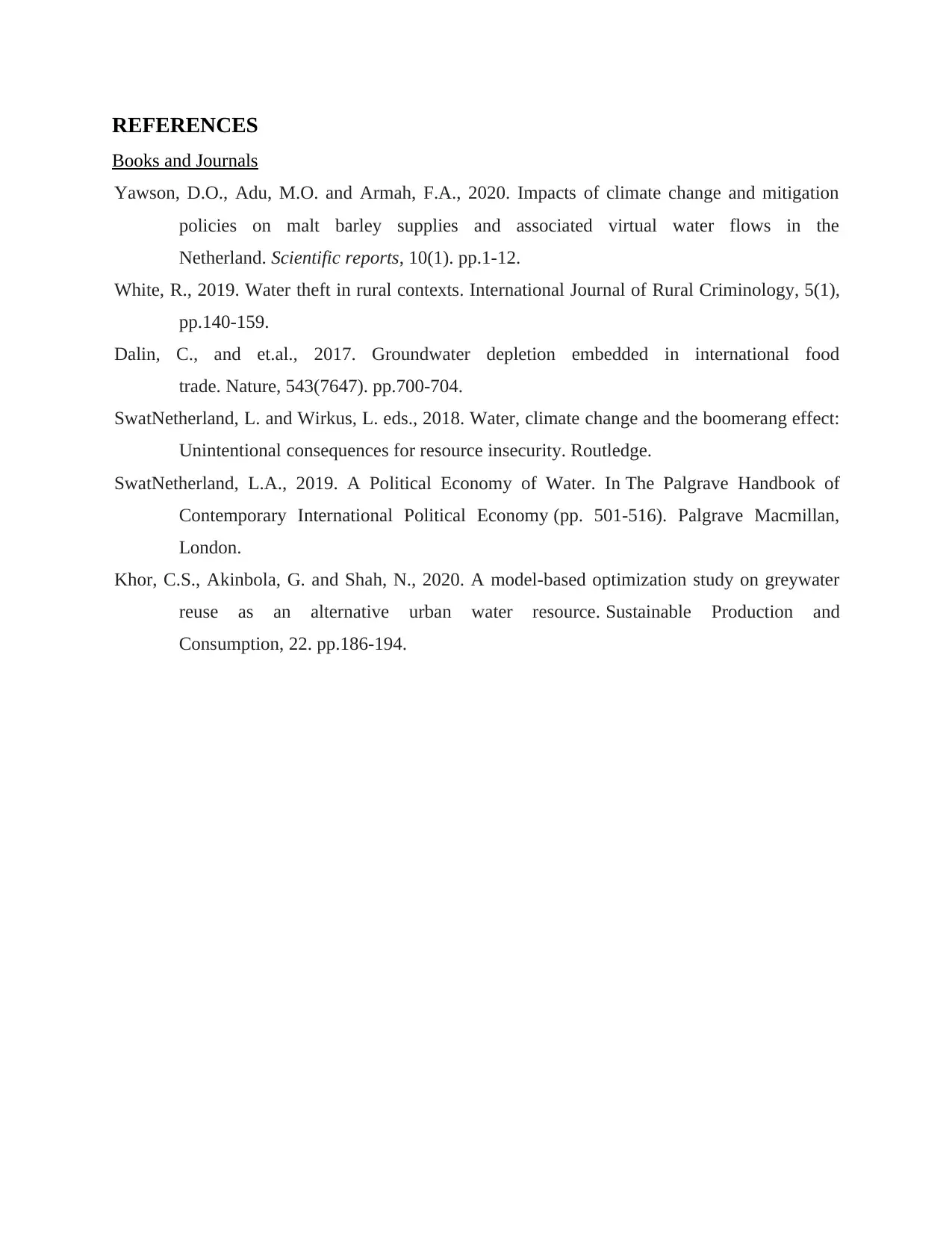
REFERENCES
Books and Journals
Yawson, D.O., Adu, M.O. and Armah, F.A., 2020. Impacts of climate change and mitigation
policies on malt barley supplies and associated virtual water flows in the
Netherland. Scientific reports, 10(1). pp.1-12.
White, R., 2019. Water theft in rural contexts. International Journal of Rural Criminology, 5(1),
pp.140-159.
Dalin, C., and et.al., 2017. Groundwater depletion embedded in international food
trade. Nature, 543(7647). pp.700-704.
SwatNetherland, L. and Wirkus, L. eds., 2018. Water, climate change and the boomerang effect:
Unintentional consequences for resource insecurity. Routledge.
SwatNetherland, L.A., 2019. A Political Economy of Water. In The Palgrave Handbook of
Contemporary International Political Economy (pp. 501-516). Palgrave Macmillan,
London.
Khor, C.S., Akinbola, G. and Shah, N., 2020. A model-based optimization study on greywater
reuse as an alternative urban water resource. Sustainable Production and
Consumption, 22. pp.186-194.
Books and Journals
Yawson, D.O., Adu, M.O. and Armah, F.A., 2020. Impacts of climate change and mitigation
policies on malt barley supplies and associated virtual water flows in the
Netherland. Scientific reports, 10(1). pp.1-12.
White, R., 2019. Water theft in rural contexts. International Journal of Rural Criminology, 5(1),
pp.140-159.
Dalin, C., and et.al., 2017. Groundwater depletion embedded in international food
trade. Nature, 543(7647). pp.700-704.
SwatNetherland, L. and Wirkus, L. eds., 2018. Water, climate change and the boomerang effect:
Unintentional consequences for resource insecurity. Routledge.
SwatNetherland, L.A., 2019. A Political Economy of Water. In The Palgrave Handbook of
Contemporary International Political Economy (pp. 501-516). Palgrave Macmillan,
London.
Khor, C.S., Akinbola, G. and Shah, N., 2020. A model-based optimization study on greywater
reuse as an alternative urban water resource. Sustainable Production and
Consumption, 22. pp.186-194.
1 out of 7
Your All-in-One AI-Powered Toolkit for Academic Success.
+13062052269
info@desklib.com
Available 24*7 on WhatsApp / Email
![[object Object]](/_next/static/media/star-bottom.7253800d.svg)
Unlock your academic potential
Copyright © 2020–2026 A2Z Services. All Rights Reserved. Developed and managed by ZUCOL.